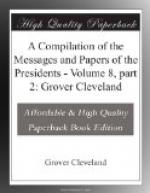ABRAHAM LINCOLN.
EXECUTIVE MANSION,
Washington City, November 21, 1862.
Ordered, That no arms, ammunition, or munitions of war be cleared or allowed to be exported from the United States until further order; that any clearances for arms, ammunition, or munitions of war issued heretofore by the Treasury Department be vacated if the articles have not passed without the United States, and the articles stopped; that the Secretary of War hold possession of the arms, etc., recently seized by his order at Rouses Point, bound for Canada.
ABRAHAM LINCOLN.
SECOND ANNUAL MESSAGE.
DECEMBER 1, 1862.
Fellow-Citizens of the Senate and House of Representatives:
Since your last annual assembling another year of health and bountiful harvests has passed, and while it has not pleased the Almighty to bless us with a return of peace, we can but press on, guided by the best light He gives us, trusting that in His own good time and wise way all will yet be well.
The correspondence touching foreign affairs which has taken place during the last year is herewith submitted, in virtual compliance with a request to that effect made by the House of Representatives near the close of the last session of Congress.
If the condition of our relations with other nations is less gratifying than it has usually been at former periods, it is certainly more satisfactory than a nation so unhappily distracted as we are might reasonably have apprehended. In the month of June last there were some grounds to expect that the maritime powers which at the beginning of our domestic difficulties so unwisely and unnecessarily, as we think, recognized the insurgents as a belligerent would soon recede from that position, which has proved only less injurious to themselves than to our own country. But the temporary reverses which afterwards befell the national arms, and which were exaggerated by our own disloyal citizens abroad, have hitherto delayed that act of simple justice.
The civil war, which has so radically changed for the moment the occupations and habits of the American people, has necessarily disturbed the social condition and affected very deeply the prosperity of the nations with which we have carried on a commerce that has been steadily increasing throughout a period of half a century. It has at the same time excited political ambitions and apprehensions which have produced a profound agitation throughout the civilized world. In this unusual agitation we have forborne from taking part in any controversy between foreign states and between parties or factions in such states. We have attempted no propagandism and acknowledged no revolution. But we have left to every nation the exclusive conduct and management of its own affairs. Our struggle has been, of course, contemplated by foreign nations with reference less to its own merits than to its supposed and often exaggerated effects and consequences resulting to those nations themselves. Nevertheless, complaint on the part of this Government, even if it were just, would certainly be unwise.




